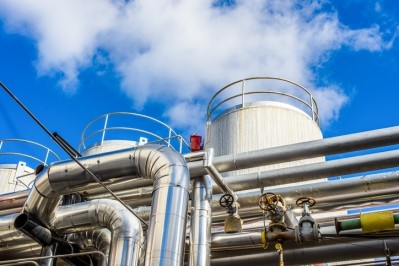Compound feed manufacturers extremely worried about rising energy costs

At the current pace, there is a growing threat for a rising number of SME type of compound feed and premix manufacturers to be driven out of business, by sharply increasing procurement costs for gas and electricity, warned the EU feed industry trade group.
The energy costs come on top of the already record-high price level feed manufacturers are paying for key ingredients, exacerbated by the Ukraine crisis.
Feed companies are implementing emergency energy-saving measures such as reduced use of feed pelleting and feed expansion technology but more is needed to be done, said Alexander Döring, secretary general of FEFAC. He told us about EU-wide actions that could help mitigate the risks for feed and food sectors arising out of the energy crunch.
He participated in what was the third meeting of the European Food Security Crisis preparedness and response Mechanism (EFSCM) network last Friday, September 23. The delegates were asked to assess the impact of the energy crisis on food security, with all the food chain partners present stressing the vital importance of energy for the continuity of agricultural and food production.
Fertilizer production got most of the attention, though, due to the immediate impact of the “out of control” gas prices on that sector, with 70% of EU fertilizer operations, consisiting mainly of ammonia production, currently shut down, noted Döring.
Subsidies targeted at energy-intensive users
The meeting followed the EU Commission’s proposal, released on September 14, to impose a temporary tax on the 'surplus profits' of the bloc's fossil fuel producers to help offset soaring power and gas bills in the region. The idea being that those revenues would be collected by member states and redirected to energy users, with vulnerable households, hard-hit companies, and energy-intensive users the priority.
“We now have to determine to what extent food chain actors can be eligible for such financial aid. We are not sure whether a feed business can be classified as an energy intensive. Ultimately, it is up to member states to define the criteria around that,” said Döring.
FEFAC wants a harmonized approach to such decision making and a recognition by EU member states of essential industry status for feed and food chain actors, as already agreed by the Commission, and a key learning from the COVID-19 crisis. “That is far from clear right now.”
Moreover, given that there is quite a gradient in terms of the energy price delta between the EU member states that are highly dependent on the Russian grid and those less reliant on such supplies, there are concerns this divide could result in a patchwork of decisions, with some member states going their own way, potentially hindering the supply of feed across borders, he said.
“We fear, as a sector, that if there is too much leeway, then the functioning of the single market could be undermined. We have received feedback from some FEFAC members that some countries are hesitating about granting agriculture and food production essential industry status and that others don’t recognize the feed industry as an energy intensive industry.”
There is a risk that some feed businesses will become insolvent if nothing is done, warned Döring. While fertilizer operators and other industries can switch to shutdown mode, feed manufacturers don’t have that luxury: “Feed compounders have to keep animals fed. Their role in terms of ensuring feed security means they need to guarantee on-time deliveries for their livestock customers, to maintain animal health and welfare.”
EU feed autonomy at risk
Competitiveness with other regions is also an issue, with EU gas prices now eight times the price of the US equivalent, a scenario that could encourage greater reliance on feed and fertilizer imports, threatening EU feed and food autonomy, warned the FEFAC spokesperson.
“We need to weigh up the mid-to long term impacts of the energy crisis on EU food security.”
As it is, there is a shortfall in certain feed raw material inputs. Soaring drying costs are making the production of ruminant feed ingredients such as alfalfa and grass pellets, in northern France, uneconomical, and a similar scenario is being played out in respect of sugar beet pulp supply. Producers claim it is no longer viable to dry it, and they are making noise about selling the pulp to biomethane players, noted Döring.
Indeed, FEFAC sees that the traditional co-product supply stream is at risk, with feedstock increasingly being diverted away from the feed industry and into the biomethane sector, given the higher return on investment in that market.
Moreover, the trade group is highly concerned about financial incentives and policy pressure to boost bioenergy production.
If the EU, through various supports, makes diverting co-products into the bioenergy sector economically far more attractive a proposition than supplying animal feeding systems, then critical nutrient streams will be lost, and the EU feed circularity and sustainability agenda will be severely hindered, argued Döring.
Biomass hierarchy
FEFAC is advocating for the establishement of a clear hierarchy for nutrient-rich biomass usage, prioritizing the take up of nutrients by the food chain over non-food users:
“We have engaged with the whole bioenergy sector on this, and we are all calling for a biomass balance sheet given that we are all currently navigating in the dark. We want to carry out some more fact-finding and, in that respect, we have requested DG Agri to provide an assessment of biomass flows. It is best placed to build on the existing EU cereals and protein balance sheets. We want it to assess all organic matter, in terms of supply streams, and look at all users of such biomass, both non-food as well as food and feed sectors.
“The biogas sector is fully aware that it should not compete on land use with the food and feed sectors. It looks at household waste and municipal waste, sludges, and manure as its primary feedstocks. But just looking at food waste, what the bioenergy sector considers agriculture residues, we consider co-products – thus, it is also a matter of getting the terminology right so that we are not talking at cross purposes when we discuss feedstocks," commented Döring.
EU oilseed processors also exposed
EU vegetable oil and protein meal assocation, FEDIOL, weighed in on the energy crisis as well, in a statement earlier this month.
"European food business operators are experiencing up to 12-fold price increases to source energy from gas and electricity, compared to pre-war situation. These developments are the reason for high production costs for EU manufacturers of vegetable oils and meals.
"Key regions outside Europe processing oilseeds have seen their costs for energy ’only’ doubling during the same period and they are not exposed to carbon prices. Expansion of crush capacity in these regions goes at the expense of EU crush and increases 3rd country dependency, which will make supplies of food and feed more vulnerable.
"European operators in our sector remain committed to continue improving the energy efficiency of their operations, find energy savings and encourage the use of renewables as a source for heat and power generation. However, the increase of cost differentials is affecting the EU industry’s competitiveness and, hence, long-term investments in Europe face a serious reality check."








